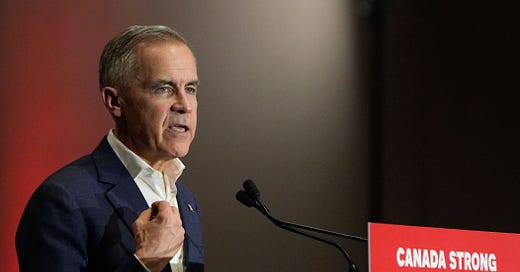“Corporate Carney” is following the wrong playbook
We need a leader with creativity and deep convictions about what a better Canada would look like. But so far, we’ve seen more “Corporate Carney” than “Visionary Carney.”
Things may look rosy as Mark Carney approaches his first half year as an active politician.
After a dominant victory in the Liberal leadership race and a come-from-behind minority win in the federal election, Carney enters the summer riding high in the polls. With the opposition leader currently locked out of Parliament and the NDP floundering, Carney stands atop Canadian politics, seemingly master of all he surveys.
However, whether the Carney-campaign playbook needs to be rewritten is worth questioning.
The Prime Minister has often spoken of how his long career in finance and public service, including stints as the Governor of the Bank of Canada and of the Bank of England, informs his approach. At his final election campaign event, he said that rather than campaigning in poetry and governing in prose, “I campaigned in prose. So I’m going to govern in econometrics.”
His ministers have commented on this change towards managerialism. Sean Fraser noted that Carney has brought a “different corporate culture.” Wayne Long said, “We’re going to see our government run like a corporation.”
However, the government is not a corporation, and being a successful prime minister requires more than believing that econometrics show the way forward.
For me, success comes down to what you do with power. Political power is not there to be held; it is there to be used to meet the challenges of our time and ensure that no Canadian gets left behind.
In my view, British Columbia’s first NDP premier, Dave Barrett, is a model of successful leadership. Barrett came to power in 1972 and pursued an aggressive and populist set of reforms that challenged the stagnant status quo, even at the expense of losing his reelection.
His premiership’s achievements included publicly owned auto insurance, the highest minimum wage in Canada, pharmacare for seniors, boosting welfare, a new Labour Relations Board, an end to natural resource extraction in provincial parks, a BC Human Rights Commission, increases in legal aid, a swathe of measures to strengthen the accountability of government and far, far more. Despite Barrett losing power in the 1975 election, many of these achievements have lasted to this day. They are a record of a bold and visionary leader who knew that power existed to be used for the betterment of his constituents.
In contrast to Barrett’s ambition, we are seeing a disappointing lack of vision from two very similar men, governing on different sides of the Atlantic: Carney in Canada, and Sir Keir Starmer in the UK. Starmer's trials and tribulations in the UK a year into power are already demonstrating why a technocratic approach to government is a perilous choice in this era of increased far-right populism, wealth disparities, and immense social and environmental challenges.
Starmer has followed a similar path to power as Carney. He had a long and celebrated career in the public service, culminating in leading the UK Crown Prosecution Service before leaping into politics. He represents a similar technocratic orthodoxy to Carney and led the UK’s Labour Party to a historic majority in last year’s election, promising a return to competence, fiscal restraint, and sound management after years of Conservative chaos that saw five different Conservative leaders in the last eight years.
However, after all that chaos, the UK “needs renewal rather than retrenchment,” and Starmer lacks a vision for achieving that.
Starmer’s lack of political vision has contributed to parliamentary revolts, a splintering of the Labour Party, and plummeting polls. Instead of articulating a progressive answer to the UK’s challenges, he has echoed the language and policies of the far right, serving only to fuel their rise. Moreover, his government has failed to deliver the urgent change the UK needs. As one UK journalist has argued, Starmer’s “refusal to engage with the intellectual elements of politics” means that he lacks “a theory of social justice” to provide the “rhetorical adhesive for policies.”
Carney’s rejection of “poetry” in favour of econometrics mirrors Starmer’s belief in competence over politics. But, as Starmer is finding out, being Prime Minister isn’t about managerialism or merely stewarding the economy towards growth. It is far bigger, far harder, and far more important.
Canada also needs renewal, not retrenchment. Achieving that requires creativity and deep convictions about what a better Canada would look like. But so far, we’ve seen more “Corporate Carney” than “Visionary Carney.”
Instead of the bold “Elbow’s Up” rhetoric Carney campaigned on, his early moves in power have at best been technocratic reversions to a stale centrist playbook and at worst, “bootlicking” concessions to our fascist neighbour to the south.
Renewal and Elbows Up doesn’t look like a reversion to old extractive business models at the cost of tearing up regulations, Reconciliation, and democratic oversight. It doesn’t mean a Trumpian militarization of our Border that breaches civil liberties and allows Canada’s immigration authorities to pursue mass deportations. It also doesn’t mean DOGE-like blanket cuts to the public service, devastating our state capacity during a very real “generational challenge.”
Steering through this moment in time needs more than a corporate belief that maximizing efficiency fixes all. After all, Canada isn’t a corporation. We need our Prime Minister to be more than a CEO.





As an additional reading reference to your thoughtful piece is Carney's 2021 book "Values: Building a Better World for All", I suggest Marc Lee's (published by the Canadian Centre for Policy Alternatives) article "Mark Carney’s Values: What his 2021 book reveals about the leader he might be" - https://www.policyalternatives.ca/news-research/mark-carneys-values-what-his-2021-book-reveals-about-the-leader-he-might-be/
I was thinking that when confronted, his natural default is to placate. As with Trump, so with Premier Smith as well.
I agree, we need more politicians willing to govern to get things done. Not just to govern. Which actually is something we see in the second Trump term.